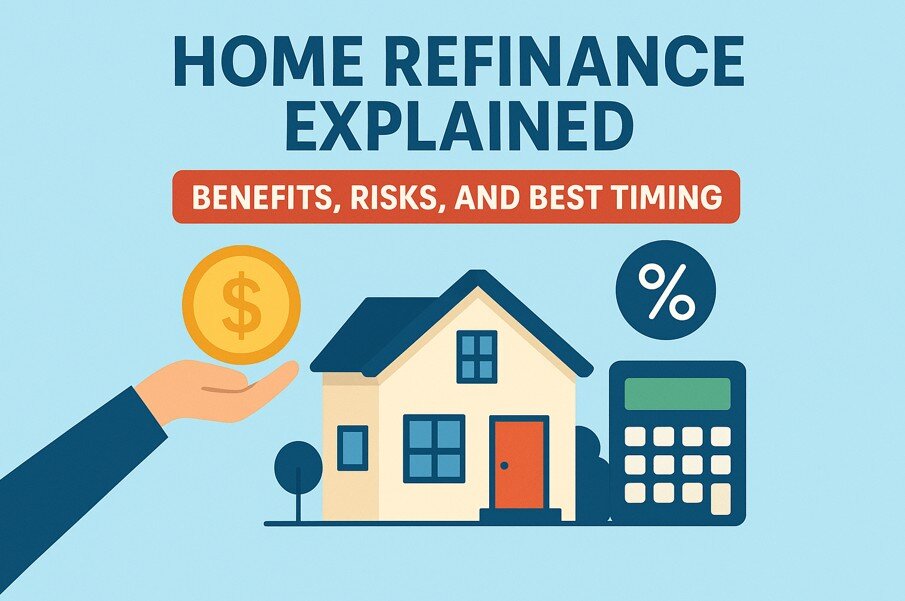
What Does Home Refinancing Mean?
How a Refinance Works?
Home refinancing means replacing your existing mortgage with a new one, often with different terms. The new loan pays off your current mortgage, and you begin making payments on the new agreement. Homeowners usually refinance to save money, lower monthly payments, or access their home’s equity.
Types of Mortgage Refinancing Options
There are several common refinancing options:
- Rate-and-term refinance – replaces your loan with better terms (lower rate or shorter term).
- Cash-out refinance – lets you borrow against your home equity and take out cash.
- Cash-in refinance – you pay down part of your mortgage balance to get better terms.
- Streamline refinance – a simplified process available for FHA, VA, and USDA loans.
Benefits of Refinancing Your Home
Lower Monthly Payments
One of the most popular reasons to refinance is to reduce monthly mortgage payments. Lowering your payment can free up cash for other expenses, savings, or investments.
Reduce Your Interest Rate
If rates have dropped since you got your original mortgage, refinancing can cut thousands of dollars in interest over the life of your loan. Even a 0.5% reduction can make a big difference.
Access Home Equity for Cash-Out
With a cash-out refinance, you can tap into your home’s built-up equity to fund renovations, consolidate debt, or cover major expenses. This can be a cheaper option than personal loans or credit cards.
Shorten Your Loan Term
Switching from a 30-year to a 15-year mortgage helps you build equity faster and save on long-term interest. While monthly payments may rise, you’ll own your home outright much sooner.
Risks and Drawbacks of Refinancing
Closing Costs and Fees
Refinancing isn’t free. Expect to pay 2%–5% of your loan amount in closing costs. If you don’t plan to stay in your home long enough, you may not recoup those costs.
Resetting Your Loan Term
When you refinance into a new 30-year loan, you may restart the clock, meaning you’ll pay your mortgage longer even if the monthly amount is smaller.
Risk of Higher Long-Term Interest Paid
If you extend your mortgage term, you might end up paying more in interest over the life of the loan, even with a lower rate.
Qualification and Credit Score Impact
Lenders check your credit score, income, and debt-to-income ratio. Multiple applications or denials can impact your credit score, and not everyone qualifies for the lowest advertised rates.
When Is the Best Time to Refinance?
Watching Interest Rate Trends
The best time to refinance is when rates are significantly lower than your current mortgage. Even a small drop in rates can mean substantial savings.
Considering Your Break-Even Point
Your break-even point is when your savings outweigh your refinancing costs. If you’ll stay in the home longer than this period, refinancing could be worthwhile.
Personal Financial Goals (Debt, Equity, Retirement)
Your decision should align with your bigger goals. Refinancing can help free up cash to pay off debt, tap into equity for large expenses, or reduce mortgage payments before retirement.
Should You Refinance or Keep Your Current Mortgage?
Who Benefits Most from Refinancing
Homeowners with higher interest rates, strong credit scores, or substantial home equity often benefit most from refinancing. It’s especially helpful if you want to lower payments or pay off your loan faster.
Situations Where Refinancing Doesn’t Make Sense
Refinancing may not be right if:
- You plan to move soon.
- You can’t get a significantly lower rate.
- Closing costs outweigh your long-term savings.
- Your credit score has dropped, making it harder to qualify for good terms.
Final Thoughts: Is Refinancing Right for You?
Refinancing can be a powerful financial tool — but it’s not one-size-fits-all. Weigh the benefits, risks, and costs carefully against your personal goals. If interest rates are favorable and you plan to stay in your home long enough, refinancing could save you money and help you achieve financial stability.
📌 FAQ Section
Is it a good idea to refinance my house in 2025?
Answer: Refinancing may be smart if current interest rates are lower than your existing loan, or if you want to lower monthly payments or access home equity.
How do I know if refinancing will save me money?
Answer: Calculate your break-even point by comparing closing costs against monthly savings. If you’ll stay in your home past that point, refinancing could be worthwhile.
What credit score do I need to refinance my mortgage?
Answer: Most lenders look for a score of 620 or higher, though the best refinance rates usually go to homeowners with scores above 740.
What are the risks of refinancing a mortgage?
Answer: Risks include high closing costs, resetting your loan term, and possibly paying more interest over the life of the loan if you extend your mortgage.
How often can I refinance my home?
Answer: There’s no legal limit, but lenders may require at least 6 months between refinances. Frequent refinancing could hurt your credit and add unnecessary fees.
Is cash-out refinancing a good idea?
Answer: A cash-out refinance can help pay off high-interest debt or fund major expenses, but it also reduces your home equity and increases your mortgage balance.
Should I refinance if I plan to sell my house soon?
Answer: Probably not — if you won’t live in your home long enough to recoup closing costs, refinancing may not make financial sense.